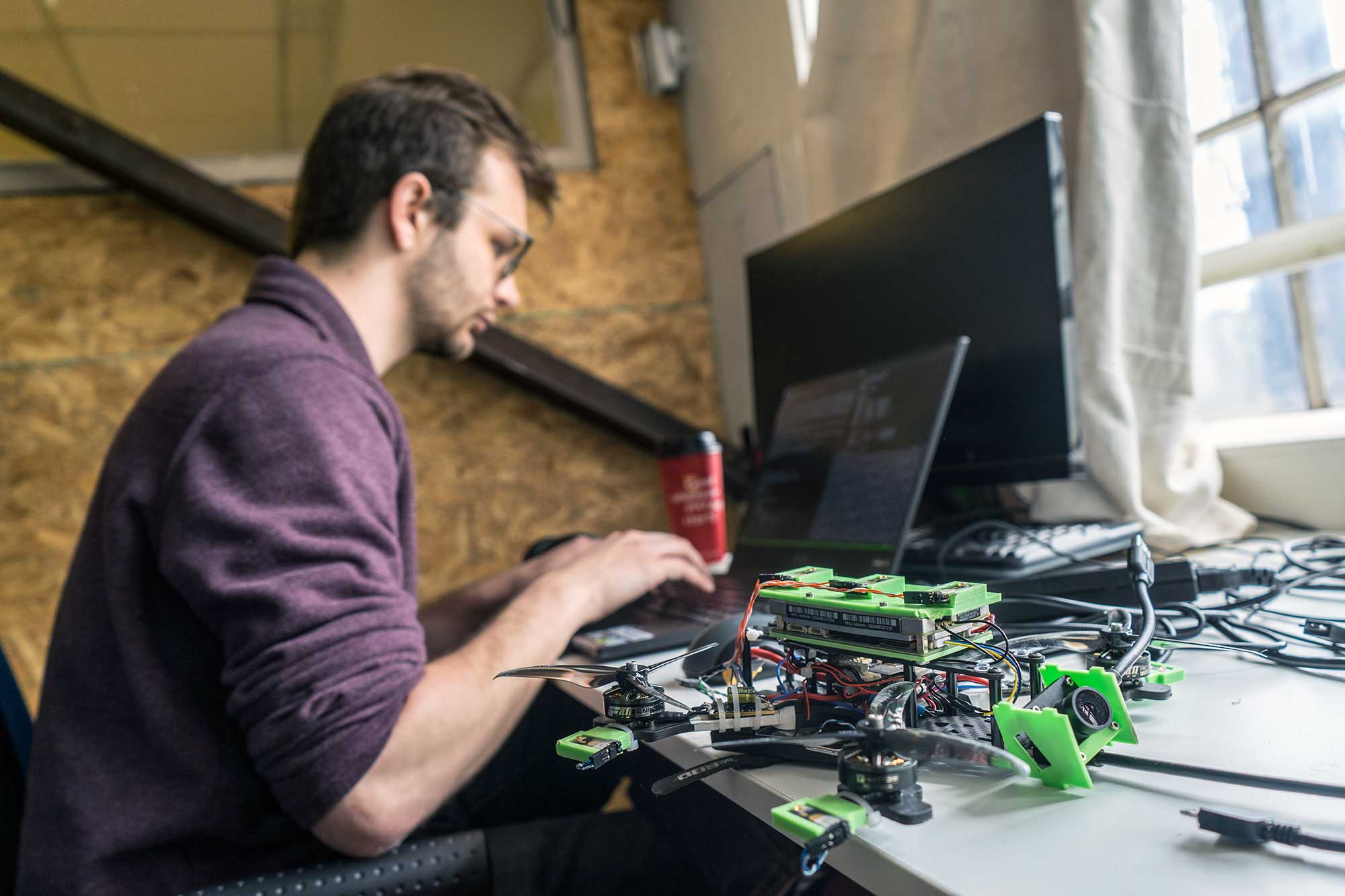From the start, Pittsburgh’s KEF Robotics wanted to produce world-class technology.
“We felt like the state-of-the-art was relatively attainable,” said Fraser Kitchell, co-founder, CEO, and the “F” in KEF Robotics.
KEF makes software that enables drones, or “unmanned aerial vehicles” [UAVs] to fly autonomously, without a human operator.
Today, KEF was named one of nine finalists in AlphaPilot, a Lockheed Martin-sponsored drone racing innovation challenge and competition, joining teams affiliated with UCLA, the University of Zurich, and KAIST, the Korea Advanced Institute of Science and Technology.
$2.25 million in prize money is up for grabs.
“The qualifying teams are regarded the best in the world at autonomous control of UAVs, so we’re thrilled to get the chance to compete with them,” said Kitchell, whose team soared to first place after qualifying rounds.
“At Lockheed Martin, we’re already accelerating AI-enabled autonomous technologies that help astronauts, military service personnel and first responders do demanding, dangerous jobs more safely and efficiently,” said Lockheed Martin Chief Technology Officer Keoki Jackson in a press release. “Through our Innovation Challenge, we look forward to working with these teams at the boundaries of AI and fully autonomous flight, and digitally transforming the way we fight wildfires, orchestrate disaster-and-recovery operations and support our front-line service personnel.”
Not bad for a company that launched just 5 months ago.
***
The day before founding KEF in December, 2018, Fraser Kitchell and fellow co-founders, Kerry Snyder and Eric Amoroso, worked their final day at Pittsburgh space robotics company Astrobotic, where they designed navigation techniques for unmanned robotic landers to explore the Moon and Saturn’s icy moon Enceladus.
Snyder was an undergrad at Carnegie Mellon University while Kitchell attended there for grad school; Amoroso joined Astrobotic right out of undergrad at the University of Pittsburgh.
Amoroso and Snyder are both FAA-licensed UAV pilots. The technology they are developing could one day render human drone pilots obsolete.
In recent years, artificial intelligence has triumphed over humanity’s best in chess, go, and even Starcraft, but for now, at least, we can still claim drone racing.
“Humans are smoking machines,” Kitchell said. “There was a famous demonstration last year where a team out of Switzerland flew a drone through a racecourse, and they won this serious competition and they averaged like 5 miles an hour.
Professional, human drone racers, by comparison, max out around 120mph.
But that won’t last for long. Not only does the winner get a million dollars, but the first team whose AI can beat human racer lands an extra $250,000 — a sponsored Lockheed Martin story in MIT Technology Review calls that the “Deep Blue” moment, after the IBM computer that defeated reigning world chess champion Garry Kasparov in 1996.

While AlphaPilot participants in the program retain their AI, contest rules stipulate “entrants agree to cooperate and assist Administrator [Lockheed Martin] if Administrator is interested in obtaining a right of first refusal to negotiate a license for Entry Code and/or Finalist Code.”
In a humble warehouse space in Pittsburgh’s Larimer neighborhood, KEF develop the software and machine learning that allows UAVs to make the split-second decisions needed to navigate drone racing courses without a human operator.
Like Astrobotic formed to compete in the Google Lunar X prize, KEF formed specifically to compete in AlphaPilot. The event, co-sponsored by the Drone Racing League and Nvidia, is billed as “the first large-scale open innovation challenge of its kind focused on advancing artificial intelligence (AI) and autonomy,” and involves a series of races over the next two years.
This technology has implications well beyond drone racing. For one, Kitchell said, their automation can be used to create a sort of driver-assist for UAVs, allowing them to take over during intricate maneuvers, say flying through a window, or giving them the ability to navigate on their own should they fly past their operator’s line of sight.
Secondly, Fraser said the government is preparing for the near-term likelihood that millions of unmanned drones will be buzzing through the skies. This is something that no amount of human air traffic controllers can handle, so the National Airspace System will need the capability to interact with some form of onboard autonomy for each individual drone.
There are also military applications. Lockheed Martin is the world’s largest arms producer, and drone autonomy is a critical field. As Foreign Affairs reported, militaries around the world are racing to develop ever more sophisticated robotic systems, and the “U.S. Defense Department road maps for robotic systems have again and again highlighted the importance of greater autonomy.”
“AI-enabled autonomy promises to fundamentally change the future of flight,” Lockheed writes on the AlphaPilot event page, “and we are actively developing disruptive new AI technologies that will help our customers accomplish their most important missions.”
Kitchell said that there is a perception that the US military is falling behind its enemies in this field, and believes there’s a need to develop this automation technology in a thoughtful way, with “plenty of communication between the government, public, and relevant agencies who decide what the future will look like.”
“While it’s pretty ethically fraught — none of us have a military background — I feel like there’s some imperative that we develop this — that good people, the right people — develop this before potential others would.”
Join our growing Slack community
Join 5,000 tech professionals and entrepreneurs in our community Slack today!
Donate to the Journalism Fund
Your support powers our independent journalism. Unlike most business-media outlets, we don’t have a paywall. Instead, we count on your personal and organizational contributions.





